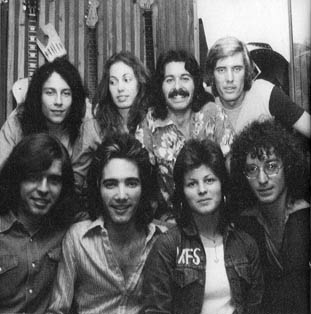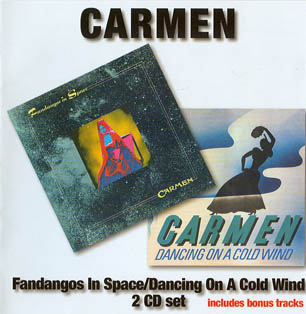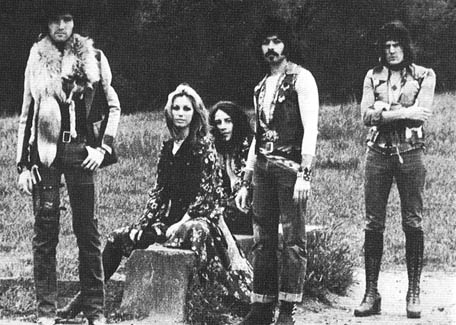
Week of December 10, 2006

Personnel:
Angela Allen - Vocals, Keyboards
David Allen - Guitar, Vocals
Roberto Amaral - Vocals, Percussion
Paul Fenton - Drums
John Glascock - Vocals
Albums:
Fandangos In Space (Regal Zonophone SRZA 8518) 1973
Dancing On A Cold Wind (Regal Zonophone SLRZ 1040) 1975
The Gypsies (Mercury SRMI 1047) 1976
'Fandangos In Space' issued on Dunhill (DP 50192) in the US. Both 'Fandangos
In Space' and 'Dancing On A Cold Wind' reissued on one CD (Line LICD
92 1150) in 1992 and now on Angel Air (2CD, SJPCD 229, 2006)
45s:
Flamenco Fever/Lonely House (Regal Zonophone RZ 3086) 1974
Bulerias/Stopping Stone (Regal Zonophone RZ 3090) 1974
Angella Allen, David Allen and Roberto Amaral originally came from Los Angeles,
California, and Carmen are regarded as one of the first flamenco-rock
groups from the West Coast. Angela later played on
Jethro Tull's 'Too
Old To Rock 'n' Roll, Too Young To Die' album. John Glasock, who also played
bass with Carmen had previously been with
Chicken
Shack on 'Imagination Lady',
Ken Hensley's
Gods and
Toe Fat (on 'Toe Fat Two')
and later, from 1976 to 1979, with
Jethro Tull.
Glasock sadly died after heart surgery in 1979.
Taken from The Tapestry of Delights - The
Comprehensive Guide to British Music of the Beat, R&B, Psychedelic and
Progressive Eras 1963-1976, Vernon Joynson
ISBN 1 899855 04 1


When books and websites mention
David Bowie's
Midnight Special TV show, filmed at the Marquee Club in London in October 1973
and broadcast to a coast-to-coast US audience the following month, they often
refer to his guests, Carmen, as 'a Spanish band'. This typifies the myth
and misinformation surrounding an outfit that were truly ahead of their time -
and, if whispers are to be believed, a strong influence on
Queen's early act and
image.
The story begins on Hollywood's Sunset Boulevard, where David and Angela Allen's
parents' flamenco restaurant, El Cid, saw David take his first musical steps in
the company of his guitarist father and dancer mother. "I was in my parents'
stage act from the age of four; I was going to be a concert guitarist because
they knew all the promoters and everything. Then the
Beatles came along and
I thought, 'the hell with this'! There came a point when I felt, 'I've spent my
whole life learning something I know really well - how can I mix it with
electric (guitar), which I love?' It became Carmen."
The band's then-manager managed to get Clive Davis and other music moguls down
to see the band, which originally formed in July 1970. But all agreed their
great live act probably couldn't be translated to record. So, in January 1973,
David used his university savings to transfer Carmen lock, stock and
barrel to a more broadminded Britain for one last try. "Within four months of
coming over we were working, by some ridiculous chance, with Tony Visconti and
rubbing shoulders with
David Bowie
and
Marc
Bolan!" Paul Fenton, the British drummer who completed the revised
line-up of the Allens, Roberto Amaral and John Glascock, recalls auditioning in
Tony Visconti's office. "We went along with a guitar, sat down on the floor and
sang. He was impressed with the originality, the dedication and the
musicianship... the following day, we were making arrangements to record."
Fenton had replaced John's brother Brian when he opted not to make the trip, and
later turned down the drum stool with
Paul McCartney's Wings,
so certain was he of Carmen's eventual success!

The band's first two albums, 'Fandangos In Space' and 'Dancing On A
Cold Wind', were recorded with Visconti in summer 1973/spring 1974
respectively and, released on Regal Zonophone, have since been described as
among his favourite productions. As David Allen explains, the first album summed
up the Carmen concept thus far, while 'Dancing On A Cold Wind' –
"my favourite, in parts" - took things a stage further. "I thought the harmonies
were great and loved the sound Tony got with the bass... big and powerful. We
were really getting good together; we went in and more or less made it up on the
spot. Very little thought had to go into it because we were so comfortable with
each other at that point." The then Mrs. Visconti, Mary Hopkin, helped
with the choral parts and, with Tony playing recorder, made the second Carmen
album something of a family affair.
The exposure on Midnight Special, still regularly broadcast on US TV to this
day, helped Carmen obtain Stateside opening slots with Rush,
ELO, Blue Oyster
Cult and Santana. But, as Paul Fenton recalls, a hoped-for tour with
Bowie,
which would have exposed them to the perfect audience, was not to be. "He
absolutely adored our band. I'm sure if he'd been touring he'd have had us with
him... but all he was doing at that time was recording." Instead they opted for
three and a half months in the US with
Jethro Tull in
early 1975. In some of the Southern states with a significantly Hispanic
population they got better write-ups than the headliners, but the match was
imperfect. Nevertheless, flute-playing frontman Ian Anderson was
impressed enough to sign up John Glascock as his bass player and have Angela
Allen sing backing vocals on their next album.
David Allen believes Carmen's stage show operated on more than one level.
The audience definitely had to listen, he says, "but at the same time there were
a lot of things in it that hit you straight in the face. My sister was a hell of
a good looking woman, Roberto was good looking too and they were both great
dancers."
But resources were insufficient to launch such a sophisticated act with the
razzmatazz it deserved and, as
Queen shot to fame with
a simpler, more direct proposition, Carmen's window of opportunity was
about to close. Mick Jagger had sounded out Carmen's management
about them opening for the Rolling Stones, but both this and a reunion
with Tony Visconti did not happen.

A third album, 'The Gypsies', reflected the stage act - as David Allen
notes, "we recorded it within two weeks of coming off a year's touring" - but
was done on a reduced budget. "It doesn't quite have the same production that
Visconti would have created," Paul Fenton admits, "but we were struggling. We
needed to do a tour with
Bowie or
someone big enough and theatrical enough to bring in the right audience, but
that wasn't going to happen so we said let's write something that's a little bit
more commercial. If they do re-issue 'The Gypsies', we'd probably take it
back to the studio and bring it into the 21st Century." Its release on Mercury
was a US-only affair.
The summer of 1975 brought the end of the Carmen story. Only John
Glascock (who played with
Jethro Tull until
his death in 1979) continued full-time in rock music, though David Allen wrote
songs for Agnetha
from ABBA's first
solo album. Since then he's become an acclaimed photographer, trained as a
psychotherapist and, recently, returned to music.
The release of these albums on CD is timely, with Hispanic music now accepted as
a commercial and cultural force. Besides, he smiles, "It's nice to think I'll
have something to show my kids!"
Carmen, for David Allen, was "a long and tangled tale. Everyone involved
was very passionate, very committed - so passionate and committed that it
probably helped the thing to blow apart at the end. It was technically very
difficult stuff. I guess the intensity was like being in Yes, though they
managed to stay together longer. We all really believed in the music we made and
found great pleasure in doing it."
Now you can share that pleasure...
Michael Heatley
August 2006
Taken from the CD reissue of 'Fandangos In Space' and 'Dancing On A Cold Wind'
(2CD, Angel Air, SJPCD 229, 2006)